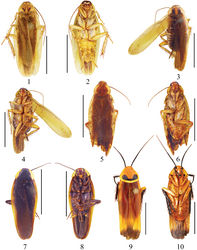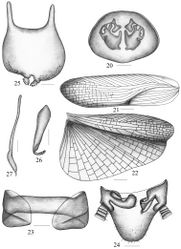Difference between revisions of "Symploce bispot"
m (Imported from ZooKeys) |
m (1 revision) |
(No difference)
| |
Latest revision as of 14:47, 30 September 2013
| Notice: | This page is derived from the original publication listed below, whose author(s) should always be credited. Further contributors may edit and improve the content of this page and, consequently, need to be credited as well (see page history). Any assessment of factual correctness requires a careful review of the original article as well as of subsequent contributions.
If you are uncertain whether your planned contribution is correct or not, we suggest that you use the associated discussion page instead of editing the page directly. This page should be cited as follows (rationale):
Citation formats to copy and paste
BibTeX: @article{Wang2013ZooKeys337, RIS/ Endnote: TY - JOUR Wikipedia/ Citizendium: <ref name="Wang2013ZooKeys337">{{Citation See also the citation download page at the journal. |
Genus: Symploce
Name
Symploce bispot Feng & Woo, 1988 – Wikispecies link – Pensoft Profile
- Symploce bispot Feng & Woo, 1988: 31.
Description
Length, male,pronotum: length × width: 4.0 × 5.0mm, tegmen: 19.0mm, overall length: 19.5–20.0mm. Body brown (Fig. 3). Head brown with area between and beyond ocellus reddish brown. Occiput region pale yellow. Antenna brown with base yellowish brown and apex dark brown. Maxillary palpomus yellowish brown and apical segment blackish brown (Fig. 4). Pronotum brown with dark brown maculae on disc (Figs 3, 20). Tergum reddish brown and both sides pale brown. Vertex with interocular width slightly narrower than ocellus width, distinctly less than distance between antennal sockets. Fourth and fifth maxillary palpomus about same length, both distinctly shorter than the third (Fig. 4). Pronotum more or less elliptical, with anterior margin nearly truncate and hind margin obviously produced in the middle; pronotum with irregular maculae as Fig. 20 on disc. Tegmen and hind wing well developed, entirely covering abdomen. Tegmen narrow and long; radius vein with apical posterior branch, which bifurcated at apical part; median vein branched near the middle (Fig. 21). Radius vein of hind wing branched around the middle and apex of branch bifurcated, median vein simple; cubitus vein with 3 complete and 4 incomplete branches, triangular apical area small (Fig. 22). Anteroventral margin of front femur Type A3, pulvilli present on 4 proximal tarsomeres, tarsal claws symmetrical and unspecialized, and arolia present. T1, T7 unmodified, 1 semitransparent spot present on disc of T3, T4, T5, T6. Lateral plate of T9 about similar and with hind margin unproduced and unspecialized (Fig. 23).
Male genitalia. Supra-anal plate in ventral view symmetrical and about linguiform (Fig. 22). Right and left paraprocts (Fig. 24) evidently asymmetrical, left one dendritic and apices tapering, right one with apex scattered with lots of fine spines and 1 branch near base, which resembles an antler. Subgenital plate (Fig. 25) slightly asymmetrical, hind margin slightly concave in the middle and produced, where with two styles lying at both sides; style nearly elliptical and with small spines at outer margin. Hook of left phallomere with sclerotized portion very small, on left side, slender and with V-shaped incision (Fig. 26). Median phallomere long and lanciform, with apex tapering and rarely curved near apex (Fig. 27).
Female similar to male. Supra-anal plate triangular, subgenital plate broad and round.
Materials examined
One male (holotype), China: Xizang Prov., 23 November 1983, coll. Yinheng Han; one female (paratype), same data as holotype; one male, China: Xizang Prov., Beibeng, 13 December 1977, coll. Jianshe Wu.
Distribution
China (Xizang).
Taxon Treatment
- Wang, Z; Che, Y; 2013: Three new species of cockroach genus Symploce Hebard, 1916 (Blattodea, Ectobiidae, Blattellinae) with redescriptions of two known species based on types from Mainland China ZooKeys, 337: 1-18. doi
Images
|

